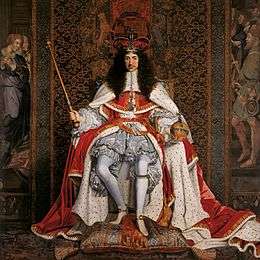1661 in England
| |||||
| Centuries: |
| ||||
|---|---|---|---|---|---|
| Decades: |
| ||||
| See also: | Other events of 1661 | ||||
Incumbents
- Monarch – Charles II
- Parliament – Cavalier (starting 8 May)

Charles II of England in coronation robes, painted by John Michael Wright
Events
- 6 January – the Fifth Monarchists unsuccessfully attempt to seize control of London. George Monck's regiment defeats them.
- 30 January – the bodies of Oliver Cromwell, Henry Ireton, John Bradshaw and Thomas Pride are exhumed and subjected to a posthumous execution.[1] Oliver Cromwell's head (with the others') is placed on a spike above the Palace of Westminster.
- 14 February – George Monck's regiment becomes The Lord General's Regiment of Foot Guards (which later becomes the Coldstream Guards).
- 15 April – the Savoy Conference of bishops and Presbyterians fails to agree on a new revision of the Prayer Book.[1]
- 19 April – the Post Office introduces post marks.[2]
- 23 April – Charles II of England, Scotland and Ireland is crowned King in Westminster Abbey.[3]
- 8 May – first meeting of the Cavalier Parliament.[3]
- 5 June – Isaac Newton admitted to Trinity College, Cambridge.[2]
- 23 June – Charles II signs a marriage treaty with Portugal. He will marry Catherine of Braganza; as part of the dowry, Portugal cedes Bombay and Tangier to England and grants free trade with Brazil and the East Indies.[4]
- 28 June – Lisle's Tennis Court in Lincoln's Inn Fields, London is opened as a playhouse.[3]
- 1 October – a yacht race from Greenwich to Gravesend between King Charles and James, Duke of York makes the sport fashionable.[1]
- October
- Collection of a "free and voluntary present" of cash for the King from householders commences.
- King Charles II appoints Peter Lely as his court painter.[3]
- December – convocations at Canterbury and York complete the new Anglican Prayer Book (forcibly imposed in 1662).[1]
- 20 December – Parliament passes the Corporation Act 1661 restricting public office to members of the Church of England.[3]
Publications
- Robert Boyle publishes The Sceptical Chymist in London, in which he developed the idea of elements and 'corpuscles' (atoms).
- John Evelyn's pamphlet Fumifugium is one of the earliest descriptions of air pollution.[5]
Births
- 16 April – Charles Montagu, 1st Earl of Halifax, poet and statesman (died 1715)
- 28 November – Edward Hyde, 3rd Earl of Clarendon, Governor of New York and New Jersey (died 1723)
- 5 December – Robert Harley, 1st Earl of Oxford and Mortimer, statesman (died 1724)
- Charles Paulet, 2nd Duke of Bolton, supporter of William III of Orange (died 1722)
- date unknown
- Samuel Garth, physician and poet (died 1719)
- Nicholas Hawksmoor, architect (died 1736)
Deaths
- 19 January – Thomas Venner, Fifth Monarchist (executed) (year of birth unknown)
- 1 March – Richard Zouch, jurist (born 1590)
- 7 April – William Brereton, soldier and politician (born 1604)
- 16 August – Thomas Fuller, churchman and historian (born 1608)
- 19 November – Brian Walton, clergyman and scholar (born 1600)
gollark: INTELLECT BEES.
gollark: Good idea.
gollark: Apioidahazards, which are intelligent?
gollark: > you are such a bee.* apiolexohazard
gollark: Apioapokteinohazards, which can kill you?
References
- Palmer, Alan; Palmer, Veronica (1992). The Chronology of British History. London: Century Ltd. pp. 188–189. ISBN 0-7126-5616-2.
- Penguin Pocket On This Day. Penguin Reference Library. 2006. ISBN 0-14-102715-0.
- Williams, Hywel (2005). Cassell's Chronology of World History. London: Weidenfeld & Nicolson. pp. 269–270. ISBN 0-304-35730-8.
- Wynne, S. M. (2004). "Catherine (1638–1705)". Oxford Dictionary of National Biography. Oxford University Press. doi:10.1093/ref:odnb/4894. Retrieved 2012-06-04. (subscription or UK public library membership required)
- The London Encyclopaedia, Ben Weinreb & Christopher Hibbert, Macmillan, 1995, ISBN 0-333-57688-8
This article is issued from Wikipedia. The text is licensed under Creative Commons - Attribution - Sharealike. Additional terms may apply for the media files.